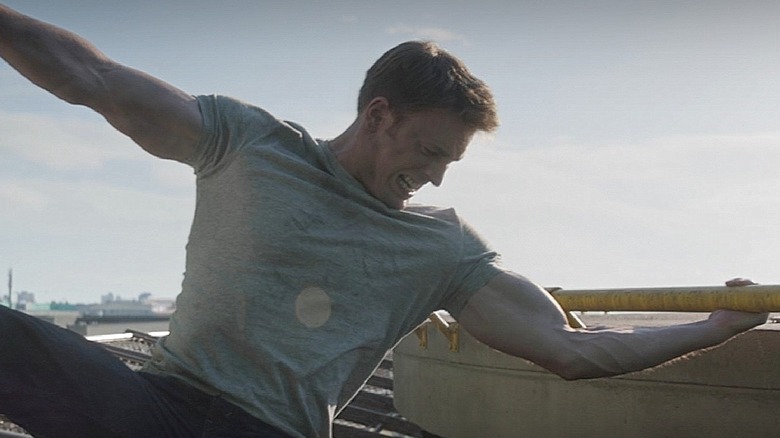Do Marvel Movie Stars Use Steroids? A Real-Life Doctor May Know The Truth
Whether it's Chris Pratt shedding his "Parks and Rec" bod for "Guardians of the Galaxy" or Kumail Nanjiani creating a god-like physique for "Eternals," the Marvel transformation is a bodybuilding phenomenon that has mystified and captivated even those outside of health and wellness circles. While it may be motivating to buy the idea that every superhero shred comes as a result of chicken and broccoli, there are many who have questioned quite openly whether or not the actors use steroids or other performance-enhancing drugs (PEDs) to reach such standards.
Dr. Todd Schroeder is an associate professor of clinical physical therapy and serves as the director of the University of Southern California Clinical Exercise Research Center at the USC Division of Biokinesiology and Physical Therapy. When Vanity Fair asked him to weigh in on the debate between "natty" and "supernatty," he estimated that between 50% and 75% of the Marvel Cinematic Universe heroes use one or more PEDs to build and maintain their impressive frames.
He clarified, however, that the process isn't as simple as an actor securing a steroid stack and waking up the next morning looking like Captain America. He explained, "...they will work with a physician as well as a nutritionist and a trainer ... it's a team." Although most actors choose not to discuss these practices publicly, as Schroeder pointed out, some who have undergone such transformations — natural or otherwise — have begun speaking more frankly about the process.
Can Marvel stars be more transparent?
There are numerous reasons why an actor may not want to disclose their use of steroids. Whether for fear of public backlash, loss of credibility, or unintentionally inspiring a fan to follow in their footsteps (without the safety resources available to a Hollywood star backed by a billion-dollar studio), it isn't hard to see why they still largely refuse to speak openly about performance-enhancing drugs.
On the other hand, this secrecy essentially requires that, by either mere omission of truth or outright lying, an actor using PEDs presents their physique as naturally obtainable. This may be why some are attempting to walk a tightrope between full disclosure and denial in order to provide a more nuanced conversation around these buzzy transformations.
When Kumail Nanjiani revealed his "Eternals" physique for the first time on Instagram, he clearly aimed to balance celebrating his personal achievement with being transparent with his many followers. Though he didn't admit to steroid use, he wrote, "I'm glad I look like this, but I also understand why I never did before. It would have been impossible without these resources and time."
Regardless of whether or not Nanjiani used PEDs, the actor seemingly wanted to impress upon fans that his workout and diet regimen are far beyond what a normal person could accomplish without tremendous outside help. He's not trying to demoralize them by claiming it's impossible, but to dissuade them from using his unrealistic results as a benchmark of success.
Natty or not, some actors are trying to keep standards realistic
Though it will likely be a long, long time before any Marvel Studios actor cops to using steroids for the MCU, there are other steps they could take — similar to Kumail Nanjiani's post — to manage the perceptions of their audience. After all, even removing steroids from the conversation, achieving a Hollywood physique is just not a realistic goal for the average person.
Perhaps "It's Always Sunny in Philadelphia" creator Rob McElhenney put it most clearly, after he underwent a dramatic physical transformation ahead of the FX series' 13th season. He wrote on his Instagram: "Look, it's not that hard. All you need to do is lift weights six days a week, stop drinking alcohol, don't eat anything after 7pm, don't eat any carbs or sugar at all, in fact just don't eat anything you like, get the personal trainer from Magic Mike, sleep nine hours a night, run three miles a day, and have a studio pay for the whole thing over a six to seven month span. I don't know why everyone's not doing this."
In this post, McElhenney elegantly lays out the many financial barriers that he's only able to overcome with the backing of a major Hollywood studio. While not every actor will be as blunt as either Nanjiani or McElhenney, they provide examples of how those in the entertainment industry could provide a more realistic — and arguably more responsible — look at those Marvelous transformations.
